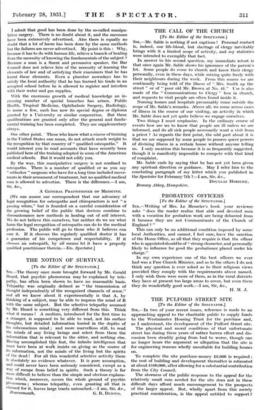THE CALL OF THE CHURCH
[To the Editor of the SPECTATOR.]
Sui,—Mr. Sable is nothing if not captious ! Personal contact is, indeed, our life-blood, but shortage of clergy inevitably brings with it a limited scope of activity, and my statistics were intended to exemplify that fact.
In answer to his second question, my immediate retort is that once again Mr. Sable shows his ignorance of the parson's lot. Some people do come to church and know their clergy personally, even in these days, while mixing quite freely with their neighbours during the week. From this source we are continually being told of the illness of "Mrs. Smith up the street" or of "poor old Mr. Brown at No. 41." Use is also made of the "Communications to Clergy" box in church, and requests to visit people are often found inside it.
Nursing homes and hospitals presumably come outside tile scope of Mr. Sable's remarks. Above all, we come across cases of illness in the course of our visiting, an activity in which Mr. Sable does not yet quite believe we engage ourselves.
Two things I must emphasize. In the ordinary course of
events how are we to know that people are ill unless we are informed, and do all sick people necessarily want a visit from a priest ? As-regards the first point, the odd part about it is that we are supposed by some people to possess queer. powers , of divining illness in a certain house without anyone telling us. I only mention this because it is so frequently. suggested, though it is manifestly impossible to compete with that kind of complaint.
Mr. Sable ends by saying that he has not yet been _given any spiritual direction or guidance. May I refer him to the concluding paragraph of my letter which you published in
the Spectator for February 7th am, Sir, &c., Romsey Abbey, Hampshire.
. DOUG LAS HORSLEY.











































 Previous page
Previous page